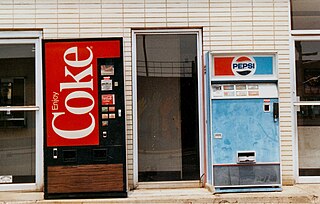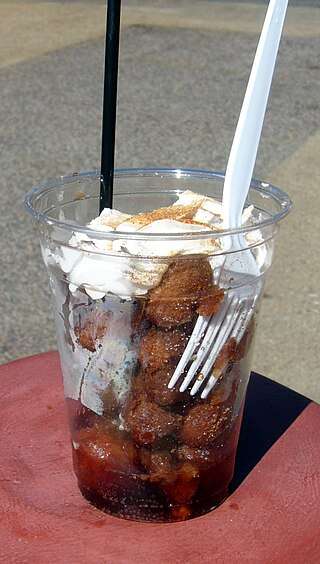
Coca-Cola, or Coke, is a cola soft drink manufactured by the Coca-Cola Company. In 2013, Coke products were sold in over 200 countries worldwide, with consumers drinking more than 1.8 billion company beverage servings each day. Coca-Cola ranked No. 94 in the 2024 Fortune 500 list of the largest United States corporations by total revenue. Based on Interbrand's "best global brand" study of 2023, Coca-Cola was the world's sixth most valuable brand.

Cola is a carbonated soft drink flavored with vanilla, cinnamon, citrus oils, and other flavorings. Cola became popular worldwide after the American pharmacist John Stith Pemberton invented Coca-Cola, a trademarked brand, in 1886, which was imitated by other manufacturers. Most colas originally contained caffeine from the kola nut, leading to the drink's name, though other sources of caffeine are generally used in modern formulations. The Pemberton cola drink also contained a coca plant extract. His non-alcoholic recipe was inspired by the coca wine of pharmacist Angelo Mariani, created in 1863.

Pepsi is a carbonated soft drink with a cola flavor, manufactured by PepsiCo. As of 2023, Pepsi is the second most valuable soft drink brand worldwide behind Coca-Cola; the two share a long-standing rivalry in what has been called the "cola wars".

An aluminum can is a single-use container for packaging made primarily of aluminum. It is commonly used for food and beverages such as olives and soup but also for products such as oil, chemicals, and other liquids. Global production is 180 billion annually and constitutes the largest single use of aluminum globally.

Cream soda is a sweet soft drink. Generally flavored with vanilla and based on the taste of an ice cream float, a wide range of variations can be found worldwide.

Crush is a brand of carbonated soft drinks owned and marketed internationally by Keurig Dr Pepper, originally created as an orange soda, Orange Crush. Crush competes with Coca-Cola's Fanta. It was created in 1911 by beverage and extract chemist Neil C. Ward. Most flavors of Crush are caffeine-free.

The Cola wars are the long-time rivalry between soft drink producers The Coca-Cola Company and PepsiCo, who have engaged in mutually-targeted marketing campaigns for the direct competition between each company's product lines, especially their flagship colas, Coca-Cola and Pepsi. Beginning in the late 1970s and into the 1980s, the competition escalated until it became known as the cola wars.

Tab was a diet cola soft drink produced and distributed by The Coca-Cola Company, introduced in 1963 and discontinued in 2020. The company's first diet drink, Tab was popular among some people throughout the 1960s and 1970s as an alternative to Coca-Cola. Several variations were made, including a number of fruit-flavored, root beer, and ginger ale versions. Caffeine-free and clear variations were released in the late 1980s and early 1990s.
Jones Soda Co. is a beverage company based in Seattle, Washington, United States. It bottles and distributes soft drinks, non-carbonated beverages, energy drinks, and candy.

The Coca-Cola Company is an American multinational corporation founded in 1892. It manufactures, sells and markets soft drinks including Coca-Cola, other non-alcoholic beverage concentrates and syrups, and alcoholic beverages. Its stock is listed on the New York Stock Exchange and is a component of the DJIA and the S&P 500 and S&P 100 indexes.

OK Soda is a discontinued soft drink created in 1993 that courted the American Generation X demographic with unusual advertising tactics, including neo-noir design, chain letters and deliberately negative publicity. After the soda did not sell well in select test markets, it was officially declared out of production in 1995 before reaching nationwide distribution. The drink's slogan was "Things are going to be OK."

PepsiCo, Inc. is an American multinational food, snack, and beverage corporation headquartered in Harrison, New York, in the hamlet of Purchase. PepsiCo's business encompasses all aspects of the food and beverage market. It oversees the manufacturing, distribution, and marketing of its products. PepsiCo was formed in 1965 with the merger of the Pepsi-Cola Company and Frito-Lay, Inc., PepsiCo has since expanded from its namesake product Pepsi Cola to an immensely diversified range of food and beverage brands. The largest and most recent acquisition was Pioneer Foods in 2020 for US$1.7 billion and prior to it was buying the Quaker Oats Company in 2001, which added the Gatorade brand to the Pepsi portfolio and Tropicana Products in 1998.

Dr Pepper is a carbonated soft drink. It was created in the 1880s by pharmacist Charles Alderton in Waco, Texas, and first served around 1885. Dr Pepper was first nationally marketed in the United States in 1904. It is now also sold in Europe, Asia, North and South America. In Australia, New Zealand and South Africa, Dr Pepper is sold as an imported good. Variants include Diet Dr Pepper and, beginning in the 2000s, a line of additional flavors.

Fried Coke or Deep Fried Soda is a frozen Coca-Cola-flavored batter that is deep-fried and then topped with Coca-Cola syrup, whipped cream, cinnamon sugar, and a cherry. It was introduced by inventor Abel Gonzales Jr. at the 2006 State Fair of Texas; Gonzales is also the creator of recipes for deep-fried butter and deep-fried beer at later Texas State Fairs. The concoction won the title of "Most Creative" in the second annual judged competition among food vendors. It proved very popular in Texas, selling 10,000 cups in the first two weeks. It quickly spread to other states, appearing in at least 47 state fairs in 2007; and now it is sold worldwide. It is unavailable in most European countries though. In 2009, Fried Coke was featured on the Travel Channel's Bizarre Foods with Andrew Zimmern. Fried Coke is estimated to have 830 calories per cup.

Cherry cola, a distinctive soft drink blend of cherry-flavored syrup and cola, traces its roots to the United States, where it gained prominence in the realm of soda beverages. The origins of this concoction can be situated within the nostalgic ambiance of old-fashioned soda fountains, where it has been consumed by consumers for years.

Pepsi-Cola Soda Shop Made with Real Sugar, originally named Pepsi Throwback and Pepsi Made with Real Sugar and still branded that way in some international markets, is a soft drink sold by PepsiCo. The drink is flavored with cane sugar and beet sugar instead of the sugar substitute high-fructose corn syrup that has been used in the standard version of Pepsi within North America since the 1980s.
Pepsi Spire is a touch screen soda fountain introduced by PepsiCo in 2014. The Spire's main competitor is the Coca-Cola Freestyle. Currently, Spire is available to retailers in two models, 2.0 and 5.0. It was designed by the Japanese machinery company Mitsubishi Heavy Industries.
















